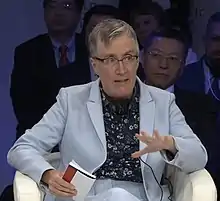Joanna Bryson
Joanna Bryson is professor at Hertie School in Berlin. She works on Artificial Intelligence, ethics and collaborative cognition. She has been a British citizen since 2007.
Joanna Bryson | |
|---|---|
 Bryson speaks at the World Economic Forum "Global Conversation on Artificial Intelligence" in 2018 | |
| Born | 1965 |
| Alma mater | MIT |
| Employer | Hertie School |
| Known for | Artificial Intelligence |
Education
Bryson attended Glenbard North High School and graduated in 1982.[1] She studied Behavioural Science at the University of Chicago, graduating with an AB in 1986.[2] In 1991 she moved to the University of Edinburgh where she completed an MSc in Artificial Intelligence before an MPhil in Psychology.[3] Bryson moved to MIT to complete her PhD, earning a doctorate in 2001 for her thesis "Intelligence by Design: Principles of Modularity and Coordination for Engineering Complex Adaptive Agents".[4] In 1995 she worked for LEGO as an AI consultant, researching child-oriented programming techniques for the product that became LEGO Mindstorms.[5] She completed a postdoctoral fellowship in Primate Cognitive Neuroscience at the Harvard University in 2002.[6]
Research
She joined the Department of Computer Science at the University of Bath in 2002.[7] At Bath, Bryson founded the Intelligent Systems research group.[8][9] In 2007 she joined the University of Nottingham as a visiting research fellow in the Methods and Data Institute.[10] During this time, she was a Hans Przibram Fellow at the Konrad Lorenz Institute for Evolution and Cognition.[10] She joined Oxford University as a visiting research fellow in 2010, working with Harvey Whitehouse on the impact of religion on societies.[10][11]
In 2010 Bryson published Robots Should Be Slaves, which selected as a chapter in Yorick Wilks' "Close Engagements with Artificial Companions: Key Social, Psychological, Ethical and Design Issues".[12][13] She helped the EPSRC to define the Principles of Robotics in 2010.[14] In 2015 she was a Visiting Academic at the University of Princeton Center for Information Technology Policy, where she remained an affiliate through 2018.[15] She is focussed on "Standardizing Ethical Design for Artificial Intelligence and Autonomous Systems".[16] In 2020 she became Professor of Ethics and Technology at Hertie School of Governance in Berlin.[17]
Bryson's research has appeared in Science and on Reddit.[18][19] She has consulted The Red Cross on autonomous weapons and contributed to an All Party Parliamentary Group on Artificial Intelligence.[20]
In 2017 she won an Outstanding Achievement award from Cognition X.[21] She regularly appears in national media, talking about human-robot relationships and the ethics of AI.[22][23]
References
- "Joanna Bryson University of Bath". www.cs.bath.ac.uk. Retrieved 2018-01-24.
- "Joanna Bryson | Conscious Cities". www.ccities.org. Retrieved 2018-01-24.
- "'Containing the intelligence explosion: the role of transparency' by Dr Joanna Bryson | Events". Oxford Martin School. Retrieved 2018-01-24.
- "Intelligence by design : principles of modularity and coordination for engineering complex adaptive agents". hdl:1721.1/8230. Cite journal requires
|journal=(help) - "RE•WORK | Joanna Bryson". www.re-work.co. Retrieved 2018-01-24.
- "Understanding Primate Intelligence through Modelling". www.cs.bath.ac.uk. Retrieved 2018-01-24.
- "Some J J Bryson biographies". www.cs.bath.ac.uk. Retrieved 2018-01-24.
- "Joanna Bryson - O'Reilly Media". www.oreilly.com. Retrieved 2018-01-24.
- [email protected]. "Contacts | Department of Computer Science | University of Bath". www.bath.ac.uk. Retrieved 2018-01-24.
- "Joanna J. BRYSON - European Forum Alpbach". European Forum Alpbach. Retrieved 2018-01-24.
- "The Evolution of Social Complexity | School of Anthropology & Museum Ethnography". www.anthro.ox.ac.uk. Retrieved 2018-01-24.
- "Episode #24 - Bryson on Why Robots Should Be Slaves". philosophicaldisquisitions.blogspot.co.uk. Retrieved 2018-01-24.
- Close engagements with artificial companions : key social, psychological, ethical and design issues. Wilks, Yorick, 1939-. Amsterdamn: John Benjamins Pub. Co. 2010. ISBN 978-9027249944. OCLC 642206106.CS1 maint: others (link)
- "Principles of robotics - EPSRC website". www.epsrc.ac.uk. Retrieved 2018-01-24.
- "Biased bots: Artificial-intelligence systems echo human prejudices". Princeton University. Retrieved 2018-01-24.
- Bryson, J.; Winfield, A. (May 2017). "Standardizing Ethical Design for Artificial Intelligence and Autonomous Systems" (PDF). Computer. 50 (5): 116–119. doi:10.1109/mc.2017.154. ISSN 0018-9162.
- "Prof. Joanna Bryson, PhD. Professor of Ethics and Technology". Hertie School. Who we are. Retrieved 2020-02-10.
- "Science AMA Series: I'm Joanna Bryson, a Professor in Artificial (and Natural) Intelligence. I am being consulted by several governments on AI ethics, particularly on the obligations of AI developers towards AI and society. I'd love to talk – AMA! • r/science". reddit. Retrieved 2018-01-24.
- Caliskan, Aylin; Bryson, Joanna J.; Narayanan, Arvind (2017-04-14). "Semantics derived automatically from language corpora contain human-like biases". Science. 356 (6334): 183–186. arXiv:1608.07187. doi:10.1126/science.aal4230. ISSN 0036-8075. PMID 28408601.
- "Professor Joanna Bryson - APPG". APPG. Retrieved 2018-01-24.
- "Joanna Bryson wins AI ethics award | University of Bath". www.bath.ac.uk. Retrieved 2018-01-24.
- Sample, Ian; Chambers, Iain (2016-07-01). "Do we want robots to be like humans? - podcast". The Guardian. ISSN 0261-3077. Retrieved 2018-01-24.
- Bryson, Joanna (2017-09-28). "The real project of AI ethics". O'Reilly Media. Retrieved 2018-01-24.